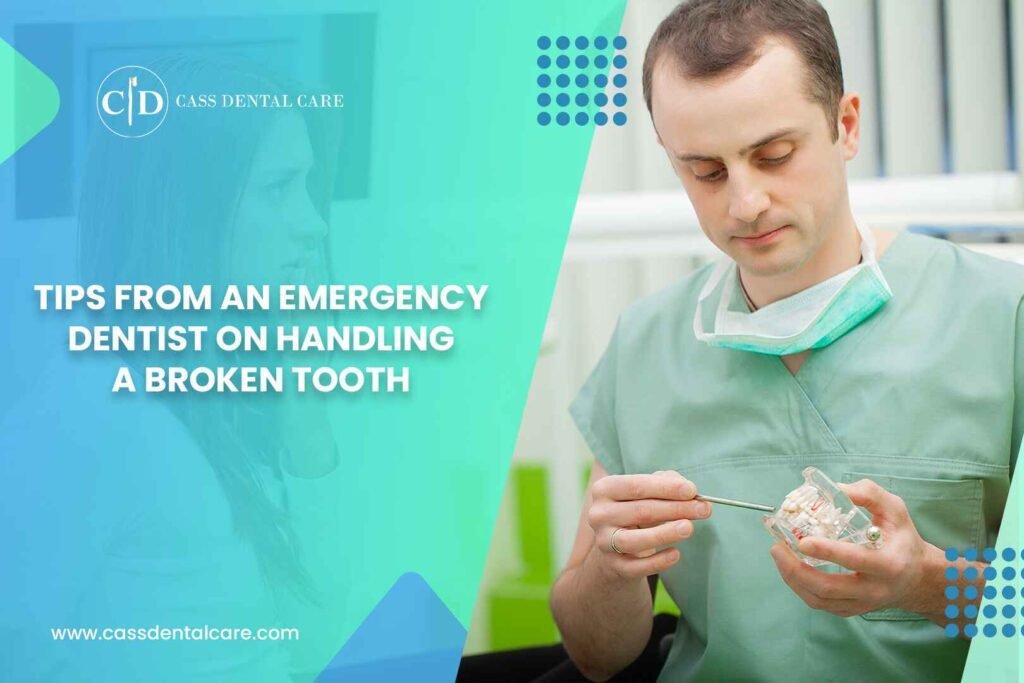A broken tooth can be a painful and stressful experience, especially when it happens unexpectedly. Whether enjoying a meal, playing sports, or simply going about your daily routine, a tooth can break or chip at the most inconvenient time. Knowing how to handle a broken tooth and understanding when to seek professional help is crucial for preventing further damage and ensuring a speedy recovery.
This blog will provide expert advice from an emergency dentist advice for broken tooth. You’ll learn what to do immediately after the incident, when to see a dentist, and how to protect your oral health until you receive treatment.
Immediate Steps to Take When You Break a Tooth
When you break a tooth, you first must stay calm and assess the situation. The severity of the break will determine the appropriate actions. If you’re unsure of the extent of the injury, follow these initial steps to manage the situation.
- Rinse Your Mouth with Warm Water
If you’ve experienced a broken tooth, it’s important to rinse your mouth gently with warm water. This will help clean the area and remove any food debris or sharp pieces of the broken tooth that could cause further injury to your mouth. Avoid using hot or cold water, as it may cause discomfort, especially if your tooth has been exposed to the air.
2. Apply a Cold Compress
If the break is painful or accompanied by swelling, apply a cold compress to the outside of your cheek near the injured area. The cold temperature will help reduce swelling and numb the pain, providing relief until you can get to a dentist.
3. Preserve Any Broken Tooth Fragments
If a large portion of your tooth has broken off, try to find and preserve the fragments. Rinse them gently with water and place them in a clean container. Bring the fragments with you to the dentist, as they may be able to be reattached, depending on the severity of the break.
4. Cover Sharp Edges
In some cases, broken teeth may have sharp or jagged edges that can cut the inside of your mouth, gums, or tongue. To avoid further injury, temporarily cover the sharp edges with dental wax or sugar-free gum until you can see a dentist. Be careful not to swallow any of these materials.
Understanding the Severity of a Broken Tooth
Not all broken teeth are the same. The severity of the break can range from a minor chip to a complete fracture of the tooth. Here’s a guide to help you understand different types of breaks and what to do in each case:
- Minor Chips or Cracks
If you’ve experienced a small chip or crack in your tooth that doesn’t cause significant pain, it may not require immediate emergency care. However, making an appointment with your dentist as soon as possible is essential to avoid further damage. These breaks can usually be fixed with dental bonding or fillings, restoring the tooth’s appearance and function.
2. Moderate Breaks or Loss of a Large Piece of the Tooth
Suppose a more significant portion of the tooth has broken off, exposing the inner layers of the tooth (the pulp). In that case, you may experience pain or sensitivity, especially to hot or cold temperatures. In this case, seeing an emergency dentist quickly is essential, as the exposed pulp can become infected. Treatment may involve a root canal or dental crown to restore the tooth’s structure and prevent further issues.
3. Complete Tooth Fracture
A complete break, where the tooth is cracked in half or completely knocked out, is considered a dental emergency. You will need to see emergency dentist advice for broken tooth treatment. In some cases, a complete fracture may require a root canal and a crown, or the tooth may need to be extracted entirely. If your tooth has been knocked out, try to place it back into its socket, if possible, or keep it in a container with milk or saltwater until you reach the dentist.
When to Seek Help from an Emergency Dentist
Knowing when to see a dentist is crucial when handling a broken tooth. While some minor cracks or chips may not require urgent attention, there are situations in which you need to act fast to prevent infection and further damage.
- Severe Pain: Experiencing intense pain, especially when chewing or drinking hot or cold liquids, may indicate nerve damage or infection. An emergency dentist near me can help provide immediate relief and treat any underlying issues.
- Visible Pulp or Nerve: If the inner part of your tooth (the pulp or nerve) is exposed, you must see an emergency dentist advice for broken tooth as soon as possible to prevent infection.
- Swelling or Bleeding: Swelling or bleeding in your gums, cheek, or jaw following a tooth break could indicate an infection or injury that requires prompt attention from a dentist.
- Tooth Knocked Out: If a tooth has been completely knocked out, seek immediate help from a dentist. In many cases, the tooth can be saved if you act quickly, especially if the tooth is re-implanted within an hour of the injury.
Emergency Dentist vs Regular Dentist: What’s the Difference?
Emergency Dentist vs Regular Dentist – while both emergency dentists and regular dentists can address dental issues, there are key differences between the two. An emergency dentist specializes in immediate care for urgent dental problems, such as broken or knocked-out teeth, severe toothaches, or infections. Emergency dentists are available outside regular office hours and can handle many urgent dental situations.
On the other hand, a regular dentist focuses on routine care, such as check-ups, cleanings, and non-urgent treatments. If you’re dealing with a broken tooth that isn’t causing severe pain or complications, you can schedule an appointment with your regular dentist. However, if the injury is severe or causing significant discomfort, it’s best to seek help from an emergency dentist.
Preventing Broken Teeth in the Future
While accidents happen, there are several steps you can take to reduce the risk of breaking a tooth in the future:
- Avoid Chewing Hard Foods: Hard foods like ice, candy, and certain nuts can put excessive pressure on your teeth and cause them to break. Avoid chewing on these foods or use your back teeth for tougher items.
- Wear a Mouthguard: If you play contact sports or grind your teeth at night, consider wearing a custom mouthguard to protect your teeth from injury. A mouthguard acts as a cushion, preventing your teeth from taking the full impact during sports or while you sleep.
- Maintain Good Oral Hygiene: Strong, healthy teeth are less likely to break. Brush your teeth twice daily, floss daily, and visit your dentist regularly for check-ups and cleanings to keep your teeth in good condition.
Conclusion
A broken tooth can be a scary experience, but with the right steps, you can manage the situation effectively. Knowing how to handle a broken tooth immediately after the injury and when to seek help from an emergency can help prevent further damage and ensure a speedy recovery.
If you need an urgent dentist Darien IL or have experienced a dental emergency, Cass Dental Care is here to help. Our experienced team of professionals provides top-notch care and treatment to get your smile back to its best. Contact us today to schedule your appointment and receive the care you need.





